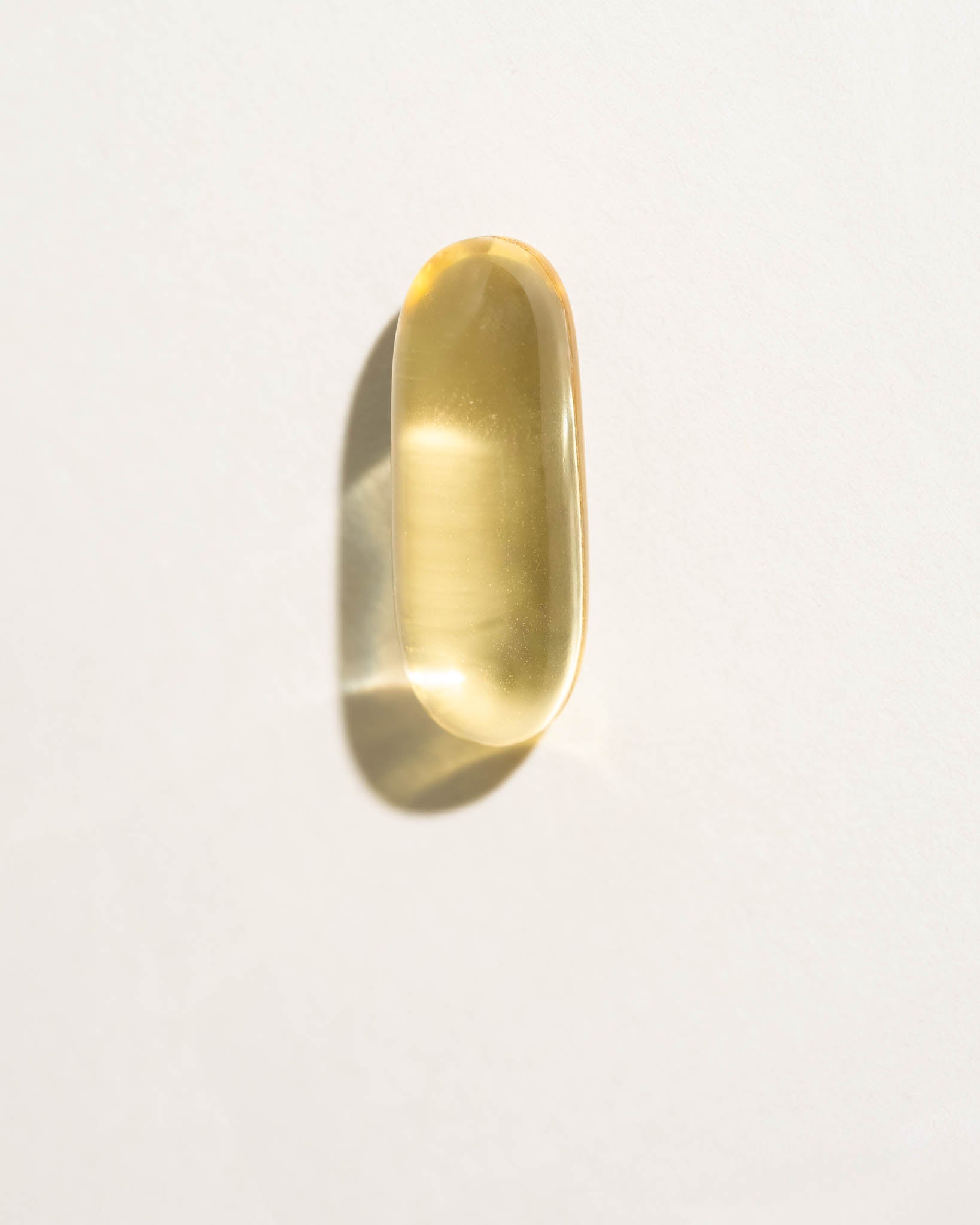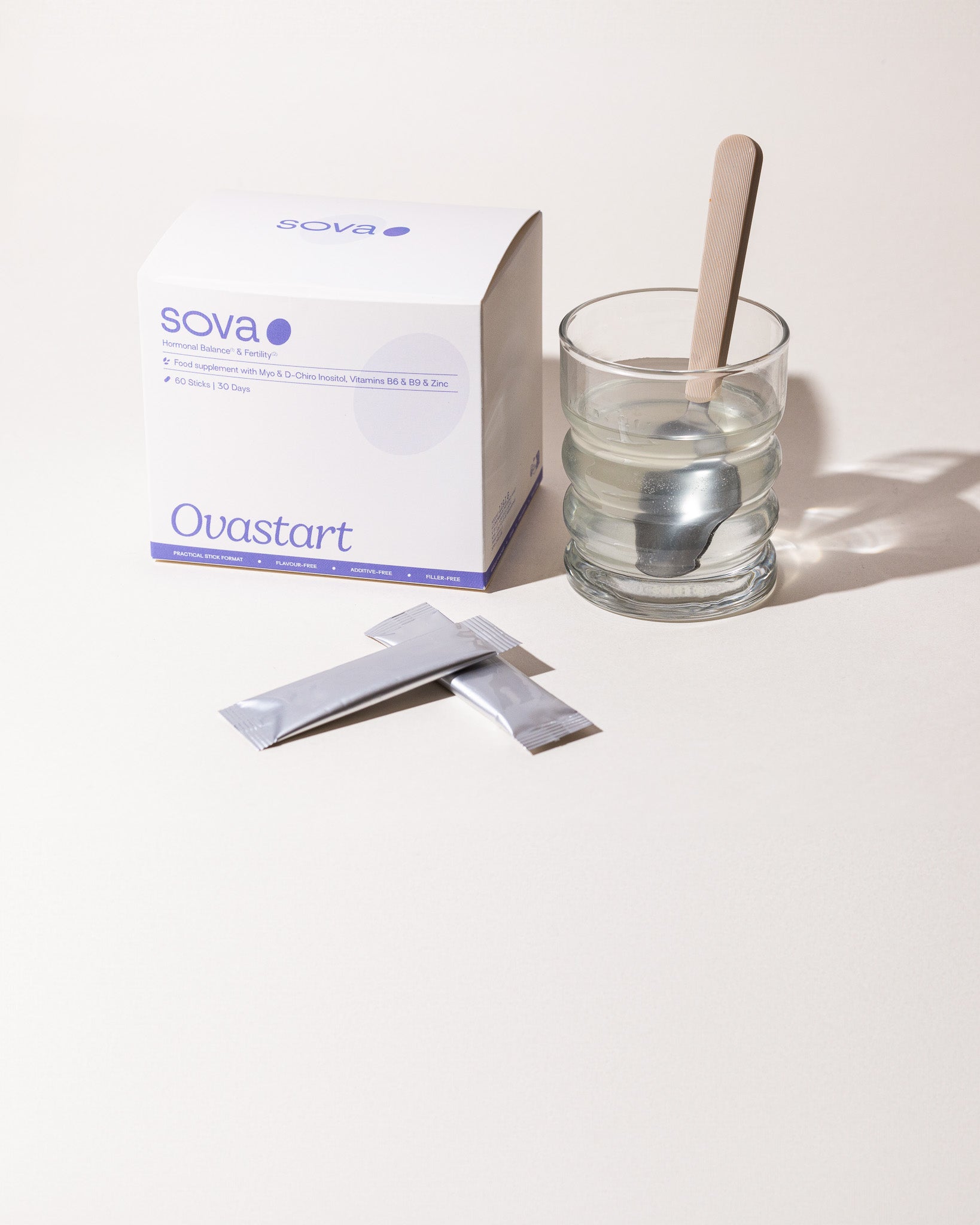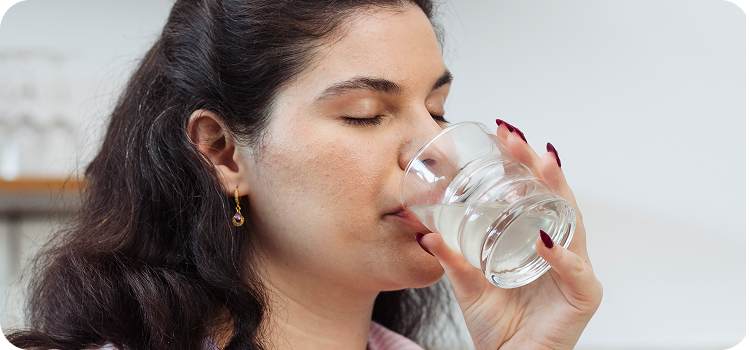Table of contents
What is inflammatory PCOS?
If you’ve read our article on the different types of PCOS, you’ll know that PCOS can be grouped into several types depending on your symptoms. One of these is Inflammatory PCOS, which we’ll be exploring today. At the root of this type lies a natural immune reaction: inflammation.
👉 Not sure what type of PCOS you might have? Take our free product quiz to get a personalised routine.

Inflammation: an immune reaction
Defending us against both external (viruses, bacteria, weather conditions, etc.) and internal (cells at the end of their life cycle, toxins from food) attacks, our immune system has several lines of defence.
The first lines of defence are our skin, serving as a shield, our various microbiomes (the bacteria and fungi housed by our bodies), and all of our secretions acting as protective barriers.
The second line of defence consists of a set of biochemical reactions, of which inflammation is a part.
Inflammation is a natural reaction of our immune system and of our body. It is triggered in response to aggression to the body, whether internal or external. This reaction then helps the body rid itself of pathogen elements that can cause dysfunctions. It also contributes to the repair of damaged tissues.
Inflammation occurs in three main stages (INSERM, Inflammation and diseases: keys to understanding, 2012):
- Detection: identification of intruders and damaged tissues (notably using substances generated by them);
- Elimination: substances released by injured tissues trigger a physical reaction that causes redness, pain, and heat. This stage involves immune cells, enzymes, and cytokines to destroy the aggressors. This is inflammation!
- Repair: once the intruders are eliminated, other reactions help repair damaged tissues.
That’s acute inflammation: useful and temporary. But when inflammation persists, we enter the realm of chronic inflammation.
Inflammation can manifest itself tangibly with such symptoms as pain (frequently), swelling, and redness, but also invisibly, more internally. Depending on the location of the inflammation, it changes its name. It is easy to recognize it thanks to suffixes in -itis: arthritis (joints), tendinitis, rhinopharyngitis (nose), otitis (ear), etc.
Chronic inflammation
Chronic inflammation is long-lasting and signals that the immune system is struggling. It’s linked to many health issues, from cardiovascular disease to autoimmune disorders.
Several possible causes leading to chronic inflammation can be listed:
- The "aggressors" do not disappear despite the effectiveness of our protection system, for example: long exposure to pollutants, heavy metals, toxic substances,
- The immune system is weakened either because it is damaged at the cellular level or can no longer eliminate pathogens and wastes,
- In case of autoimmune disease, the immune system starts attacking healthy cells in the body and turning against itself as if it were an agent to be eliminated, creating chronic inflammations,
- Imbalances in our intestinal microbiota (abnormal presence of aggressive bacteria),
- Oxidative stress (through degradation of our cells into molecules which then become unstable and hard to eliminate, creating local inflammation) exacerbated by lifestyle habits: tobacco, alcohol, drugs, sedentary lifestyle, overweight, chronic stress, etc.
Chronic inflammation, unlike acute inflammation, can go unnoticed even on a blood test. Often, the person experiences symptoms which they will not necessarily link to this immune reaction:
- Chronic pain: joint, muscular, painful periods, headaches, etc.
- Various digestive disorders: alternating diarrhoea / constipation, sticky stools, abdominal pain, bloating, gas, etc.
- Persistent weight gain, or conversely, weight loss,
- Chronic fatigue,
- Recurring viral infections (chronic "winter" conditions, chronic mycoses or urinary tract infections, etc.),
- Chronic disease of any kind,
- Mood disorders, depression, anxiety.
This chronic inflammation can have negative consequences for both your overall health and your menstrual cycle!

How inflammation impacts hormones & PCOS
Chronic inflammatory reactions can impact our female hormones.
Indeed, hormonal production balance is fragile and can be easily disrupted through habits (stress, diet, lack of physical activity, etc.). Inflammation can interrupt communication between our endocrine glands (organs producing hormones), especially the pancreas, ovaries, adrenal glands, and the thyroid.
Estrogens, which are part of our sex hormones secreted partly by the ovaries, have a particular connection with chronic inflammation. They are crucial for the overall functioning of our body. They participate in our reproductive function but are also necessary for the proper functioning of our cardiovascular system, skeletal system, memory, and immune response (Endocrine Reviews, Oxford Academic).
The role of estrogens is bimodal: both deficiency and excess of estrogens can cause inflammation (Endocrine Reviews, Oxford Academic). Therefore, it is really important to find the right hormonal balance to modulate inflammation.
Functioning of the ovaries is particularly affected by inflammation as the ovaries may begin to produce an excess of testosterone (male hormone), at the expense of estrogens, thereby hindering the natural ovulation process. This is the case, for example, in Polycystic Ovary Syndrome (Endocrine Reviews, Oxford Academic).
Menstrual cycles then get disrupted in terms of length, absence of ovulation, pain, heavier flow, etc.
Insulin, the hormone responsible for lowering blood sugar levels, is also negatively impacted by chronic inflammation. Inflammation can cause insulin resistance—making your body's cells less sensitive to insulin—leading to uncontrolled weight gains. The pancreas will be forced to release more insulin to allow glucose to enter cells, but this is a vicious circle as our cells will increasingly become resistant to it (Health.com).
Insulin also participates in the breakdown of fats after eating. When produced in excess, it pushes us to eat more, making us gain weight (Health.com). Fat that is not eliminated is stored in fat cells (belly, thighs, buttocks in women) which in turn releases pro-inflammatory substances… It's a vicious circle!
Excess insulin also encourages the overproduction of male hormones involved in the development of PCOS. The cause becomes the consequence and vice versa (Health.com).
👉 Curious about insulin’s role? Read our article on Insulin Resistance & PCOS.
The link between PCOS and inflammation
PCOS symptoms can be divided into four different categories that allow better management of the aggravating factors. These four types are: insulin-resistant PCOS, adrenal PCOS, inflammatory PCOS, and thyroid PCOS— post-pill PCOS is not mentioned since it is not a "true" PCOS but the result of taking synthetic hormones over long periods, resulting in temporary hyperandrogenism—.
Today we are interested in inflammatory PCOS, which as the name suggests, is mainly aggravated by the phenomenon of inflammation. As we saw earlier, many mechanisms related to PCOS are caused or aggravated by the inflammatory response: insulin resistance, excessive production of androgens, and uncontrolled weight gain, amongst others.
Several studies have confirmed the excess presence of inflammation markers in women with PCOS (source). The particular influence of our lifestyle habits on the expression of genes related to PCOS and chronic inflammation has been demonstrated by scientists (source). This means that PCOS symptoms are improved or worsened by our daily habits, the environment in which we grew up, and even where we live.
Inflammatory-type PCOS is also sensitive to the presence of endocrine disruptors in the person's direct environment (diet, cosmetics, etc.) which disrupt our cellular hormonal sensors, thus interrupting ovulation. It also causes an increase in stress hormones that further increases androgen production.
This type of PCOS, like adrenal PCOS, is exacerbated by both both physical and mental chronic stress. If you want to learn more about adrenal PCOS, head out to our dedicated blog article.
Symptoms related to this chronic inflammation include: recurrent headaches, digestive pain, joint pain, inflammatory acne (red and painful), and persistent fatigue despite rest.

Impacts of chronic inflammation on fertility
Fertility in women is closely linked to the ovulation cycle and the ability to produce quality ovulation conducive to fertilisation. Various aspects of ovarian function, including ovulation, can be likened to an inflammatory process (source). Therefore, the ovulatory cycle is particularly sensitive to chronic inflammation, which can disrupt the whole process.
Recent studies have shed light on ovarian function, indicating that various processes occurring in the ovary resemble inflammatory processes. Various mediators of acute inflammatory reactions appear to be important components of ovulation, corpus luteum formation (i.e. the follicle releasing the dominant egg transforms into the corpus luteum, which then produces progesterone), and the subsequent degeneration of the latter. This implies that a controlled inflammatory reaction is necessary for ovulation to occur.
Chronic inflammation can thus have negative consequences on egg formation and release by the ovary. This alteration of the ovulatory process can ultimately lead to functional infertility.
Several links have been established between chronic inflammation and infertility (source):
- Risk of infertility is higher in conditions marked by inflammation, including chronic infections, endometriosis, and polycystic ovary syndrome
- Inflammation can affect the uterus, cervix, and placenta, thus altering fertility
- Infertile women who undergo IVF and follow an anti-inflammatory diet tend to have higher successful pregnancy rates than those who do not follow such diet.
👉 Want to learn more? Check out our article on PCOS & fertility.
Managing inflammatory PCOS
To alleviate symptoms associated with inflammatory PCOS, several changes can be made such as: adopting an anti-inflammatory diet, learning to manage stress, and getting moving through regular enjoyable physical activity.
Support your digestion
The links between our diet and chronic inflammation are undeniable since the intestines are one of the main offices of our immune system and play a frontline role in eliminating intruders hidden in our diet.
Indeed, our intestines’ lining actively participates in defending our body. Its protective role is manifold:
- The first source of protection involves the presence of specific immune cells called enterocytes who check for potential pathogens in the remnants of digested food.
- The second source of protection is represented by tight junctions that form a barrier around each cell, preventing the passage of molecules from the inside of our digestive system into the bloodstream.
- The third protection lies in the production of mucus lining the intestinal walls, thereby preventing direct contact with microorganisms (viruses, bacteria, pathogenic fungi).
- Finally, the last protection is provided by our intestinal flora: a combination of viruses, bacteria, and fungi with which we coexist in exchange for their contribution to the proper functioning of our body (including regulation of pathogenic germs).
However, some so-called pro-inflammatory foodstuffs weaken the intestinal lining. This is particularly so with both gluten-containing cereals and dairy products containing substances difficult to digest (prolamins for gluten, casein and lactose for milk).
In some individuals, these molecules are even more difficult to manage either because of their genetics (e.g., they do not produce enough digestive enzymes since birth) or because they have developed increased sensitivity over time (weakening of the digestive system due to a diet high in sugars, fats, and poor in good nutrients).
These molecules end up cluttering up the tight junctions of the intestinal lining, creating localised inflammation to eliminate them. This, in turn, deteriorates the intestinal barrier, making it more porous. Increased permeability leads to greater passage of pathogens and toxic molecules into the blood, contributing to chronic inflammation.
If you have noticed that you suffer from pain, bloating, or digestive issues (diarrhoea / constipation) after consuming certain foods, you may have a food intolerance (detectable through medical exams) or at least a food hypersensitivity (undetectable through exams). In such cases, try excluding the culprits (gluten-containing cereals, dairy products) for a few weeks to see if that brings about improvements.
Furthermore, you may also suffer from a food intolerance to a group of foods known as FODMAPs (oligosaccharides, disaccharides, monosaccharides, and polyols fermentable by intestinal flora). FODMAPs are perfectly healthy short-chain carbohydrates (simple sugars) found in many common foods. However, in some people, these sugars are poorly absorbed by the small intestine, causing discomfort or even intense gastric pain after meals. This intolerance to FODMAPs is generally synonymous with a condition called irritable bowel syndrome (IBS).
Temporarily excluding these foods and then reintroducing them in a reasonable manner will help reduce your chronic inflammation and potential digestive symptoms.

Adopt an anti-inflammatory diet
Since our gut flora (or microbiota) plays a role in overall health, nurturing and balancing it through getting all the necessary nutrients should reduce digestive inflammatory processes.
Unfortunately, research has shown that individuals with PCOS have a less diverse microbiota which may be less able to balance things up.
Studies on rodents have even suggested that gut flora imbalance could play a causal role in PCOS and that improvements in the microbiota could be a potential treatment option.
Two types of foods can help nourish our microbiota: prebiotics (which nourish the gut flora) and probiotics (consisting of good bacteria to temporarily renew the flora).
Science has shown that a diet low in prebiotics reduces bacterial populations of our gut microbiota, while a high intake one, improves its composition.
Moreover, a recent study has also shown that prebiotics may improve sleep quality after a stressful event.
Prebiotic-rich foods include vegetables (preferably fresh and in season), such as leeks, asparagus, Jerusalem artichokes, artichokes, salsify, onion, and beetroot (this list is not exhaustive).
Fibre-rich vegetables (such as spinach, beets, broccoli, or Brussels sprouts) contribute to a healthy gut microbiota and regulate transit. Fibres help control our blood sugar levels and make us feel full, thus helping to better control our appetite.
Probiotic-rich foods contain "good bacteria" that help balance our gut microbiota. Examples include:
- Kefir or kombucha (fermented sparkling drinks)
- Lacto-fermented vegetables (in jars) such as sauerkraut, kimchi, or cabbage
- Coconut yoghourt
- Pickles
- Miso
Adopt anti-inflammatory diet
A good dietary approach to managing PCOS symptoms will focus on managing chronic inflammation in two ways:
Firstly, through a decrease in pro-inflammatory food intakes: refined cereals and flours, over processed food, cakes, pastries, desserts, fast food are all sugar-rich and have deleterious effects on blood sugar and insulin levels. We can also add to this list ultra-processed and heated vegetable oils (such as Isio 4, sunflower oil available in supermarkets), stimulants (coffee, tea, chocolate, alcohol), red meat, and deli meats.
On the other hand, you can ingest more omega-3-rich foods, as they help fight inflammation, such as fat, omega-3 rich fish (mackerel, sardines, anchovies, cod) at least twice a week. You can also season salads and other dishes with 2 tablespoons per day of a cold-pressed organic omega-3 rich vegetable oil such as flaxseed, hemp, camelina, walnut, or rapeseed oil.
The positive effects of regular omega-3 intake with PCOS include: improved blood sugar regulation, reduced inflammation markers, and decreased testosterone production.
Sufficient intake of quality water is also recommended to both promote elimination and temper the inflammatory response. You should drink 1.5 to 2 litres of water on average per day, preferably low-mineral water (with a dry residue at 180°C of less than 120 mg/l). This will help you eliminate better, prevent chronic pain from inflammation and facilitate weight loss,

Managing stress and emotions
As we have seen, inflammation is part of a natural defence mechanism. When you are subjected to prolonged stress, it causes an overproduction of stress hormones, especially cortisol, which triggers an immune system overdrive.
Studies have linked stress and inflammatory processes of the central and peripheral nervous systems. Therefore, it is important to learn to better manage our stress and emotions if we want to alleviate symptoms related to chronic inflammation.
One of the most commonly used techniques for stress management is breathing. Breathing is a physiological activity that depends on our autonomic nervous system, meaning it typically does not require any voluntary action from us. Breathing must be adapted at all times, depending on the body's oxygen needs. However, it can also be controlled by the voluntary nervous system under the command of the central nervous system as we can voluntarily modulate our breathing when needed. This link between breathing and the nervous system explains the importance of stress response regulation tools based on breathing modulations.
You may influence your stress levels with several breathing modulation techniques such as: cardiac coherence, mindfulness meditation, and relaxation.
Various dynamic relaxation techniques focus on positive body sensations. As for creative visualisations (imagining situations, landscapes), they offer the possibility of circumventing mental mechanisms that perpetuate stress.
Get moving
Physical activity is a major determinant of health status, physical condition, autonomy with advancing age, and quality of life. It is considered a fully fledged non-drug therapy in many chronic diseases and health conditions.
Studies have shown that increasing the frequency of physical activities, including cardio exercises, decreases chronic inflammation markers. Moderate physical activity may fight against inflammation and the benefits start with a 20 minute session only. There is no need for intense HIIT sessions lasting several hours to appreciate the effects of your sports practice!
Another study has also shown that physical activity may regulate chronic inflammation in obese adolescents while facilitating weight loss—of particular interest for overweight women with PCOS—.
However, intensive sports practice such as training for competitions can have detrimental effects on our immune system and may be associated with increased inflammation. Stress caused by high-intensity exercises may weaken the body, eventually leading to defence weaknesses and micronutrient deficiencies (vitamins, minerals).
Consistency is better than intensity. Moreover, naturopaths often recommend short, regular, and enjoyable sessions. The best physical activities for you will be the ones that will bring you pleasure, the key to sustainability.
Omega-3 fatty acids to reduce inflammation

As seen previously, it is important to reduce inflammation processes as part of managing PCOS symptoms, especially if you suffer from an inflammatory type of PCOS. Diet certainly plays a significant role.
However, it may be relevant to combine dietary intake of omega-3 fatty acids (see paragraph on inflammation) with supplementation of omega-3 capsules, especially EPA and DHA.
Omega-3 fatty acids are necessary for the development and functioning of the retina, brain, and nervous system. In the cardiovascular field, scientific data also show that omega-3 fatty acid intake promotes:
- lower blood pressure in people with high blood pressure,
- a decrease in the amount of blood triglycerides which are a type of fats that, in excess, contribute to heart diseases,
- a reduction in cardiovascular morbidity and mortality in people with pre-existing cardiovascular pathologies.
EPA and DHA are the usable forms of omega-3 found primarily in fatty fish (the body does not have to process them to utilise them). Unfortunately, more often than not, women with PCOS have more difficulty synthesising these omega-3 fatty acids from diet due to vitamin and mineral deficiencies (especially B vitamins), excess male hormones and cortisol, and insulin resistance which inhibit Omega-3 fatty acid conversion to EPA and DHA.
According to several studies, EPA and DHA intake as part of lifestyle measures has resulted in:
- improvement in insulin sensitivity,
- better lipid metabolism with a reduction in cholesterol levels and thus a reduction in cardiovascular risk,
- reduction in blood glucose levels,
- improvement of hormonal profile (more regular cycles, quality of ovulation).
Taking an EPA / DHA dietary supplement appears to be very relevant in the management of PCOS.
Official recommendations vary from 1 to 4 grams per day of omega-3 fatty acid (from a combination of EPA and DHA) through oil capsules at a usual dosage of three capsules at dinner for better assimilation by the liver overnight.
SOVA’s own Omega-3 fatty acid supplement comes from high-quality EPAX® omega 3 with a ToTOX (Total Oxidation) index of 8. You’ll get both high-strength EPA (800 mg) and DHA (600 mg) with just 2 capsules!
Key takeaway
To briefly sum up, if you suffer from inflammatory PCOS, you can reduce your symptoms by:
- adopting an anti-inflammatory diet,
- improving your stress and emotion management through breathing, amongst other techniques,
- engaging in regular (low-intensity) physical activity,
- supplementing with omega-3 fatty acids.
If you need help determining your PCOS type and how to manage your symptoms naturally, do not hesitate to seek guidance from a naturopath, dietitian, or specialised nutritionist!
SOVA was created by two sisters with PCOS who wanted products that truly worked. Our formulas are developed in-house with women’s health and micronutrition experts, using ingredients backed by clinical studies and compliant with European regulations.
- Built by women with PCOS, we know the reality of the symptoms.
- Clinically studied, high-quality ingredients, including patented forms like Quatrefolic® and an optimal Myo-/D-Chiro Inositol ratio.
- Holistic support for hormonal balance, metabolic health, inflammation, mood and cycle regulation.
- Transparent, science-led formulas with no unnecessary additives.
















